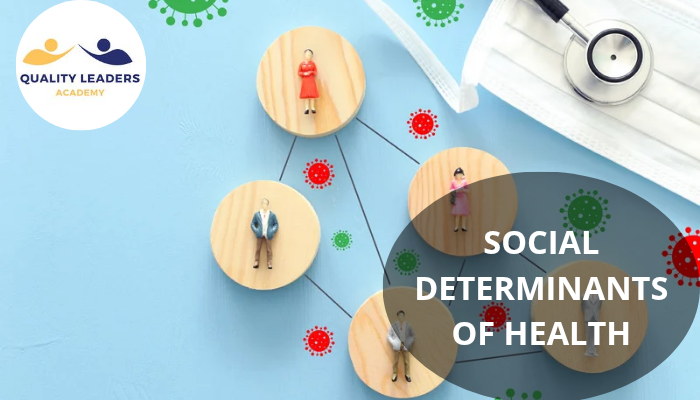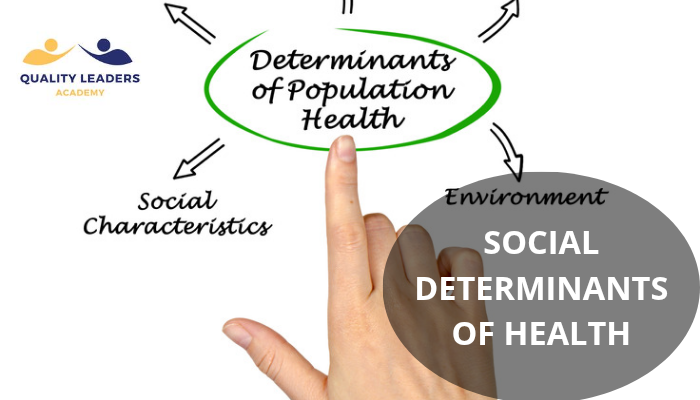Social determinants of health (SDOH) refer to the non-medical elements that influence health outcomes, including the surroundings where people are born, grow up, live, work, and age. Understanding social determinants of health is essential for improving health equity and designing effective healthcare strategies. As public health priorities shift toward a more holistic view of well-being, professionals and organizations must recognize how social, economic, and environmental factors shape patient outcomes.
This article explores what social determinants of health are, why they matter, key categories, their impact on healthcare, and how healthcare professionals can address them, including through advanced training such as the CPHQ certification programs from Quality Leaders Academy.
WHAT ARE SOCIAL DETERMINANTS OF HEALTH?

According to the World Health Organization (WHO), social determinants of health are the broader set of forces and systems affecting the circumstances of daily life. These determinants can either promote health or contribute to poor health outcomes and inequities.
They are grouped into five major domains:
- Economic Stability.
- Education Access and Quality.
- Healthcare Access and Quality.
- Neighborhood and Built Environment.
- Social and Community Context.
Each of these domains plays a significant role in shaping an individual's physical and mental health throughout their lifetime.
WHY ARE SOCIAL DETERMINANTS OF HEALTH IMPORTANT?
The Centers for Disease Control and Prevention (CDC) highlights that up to 80% of a person’s health is influenced by SDOH, not just clinical care. For example:
- A patient with diabetes might struggle to manage their condition not because of poor clinical advice, but due to a lack of access to healthy food or safe exercise spaces.
- People living in underserved neighborhoods may experience higher exposure to pollution, violence, or inadequate transportation.
By addressing these root causes, healthcare providers can offer more personalized, effective, and equitable care.
KEY SOCIAL DETERMINANTS OF HEALTH EXPLAINED
1. Economic Stability
Economic stability affects the ability to obtain healthy food, secure housing, and access preventive healthcare services. Individuals in poverty are more likely to experience chronic stress, poor nutrition, and unmet health needs.
2. Education Access and Quality
Education is a powerful predictor of health. Higher educational attainment is associated with healthier behaviors, better jobs, and improved problem-solving skills related to healthcare.
3. Healthcare Access and Quality
Timely access to healthcare services, insurance coverage, and culturally competent care ensures patients receive appropriate treatment. Limited access results in postponed diagnoses and poorly controlled health issues.
4. Neighborhood and Built Environment
Safe housing, clean water, green spaces, and public transportation contribute to better physical and mental health. Poor infrastructure or unsafe neighborhoods can exacerbate disease risks.
5. Social and Community Context
Supportive relationships, community engagement, and freedom from discrimination are critical to emotional and psychological well-being. Social isolation and systemic inequality create lasting health gaps.
THE IMPACT OF SOCIAL DETERMINANTS ON HEALTHCARE DELIVERY
Incorporating social determinants of health into care models can transform outcomes. Healthcare organizations are increasingly using data-driven insights to screen for social needs and provide holistic care plans.
For example, tools such as ForeSee Medical and Icario assist healthcare providers in detecting patient risks linked to social determinants of health and customizing interventions accordingly.
Addressing transportation needs, housing insecurity, or food deserts can reduce hospital readmissions and improve medication adherence.
Moreover, value-based care models and quality improvement initiatives now reward organizations that address social drivers, emphasizing prevention over treatment.
HOW CAN HEALTHCARE PROFESSIONALS ADDRESS SOCIAL DETERMINANTS OF HEALTH?

1. Screening and Documentation
Implementing routine screenings for social needs, such as food insecurity or unsafe living conditions, helps providers identify underlying challenges affecting care adherence.
2. Building Community Partnerships
Collaborating with local nonprofits, housing authorities, food banks, and mental health agencies extends the reach of clinical care into the community.
3. Cultural Competency Training
Understanding patients’ backgrounds and cultural contexts fosters trust and improves communication.
4. Continuous Quality Improvement
Incorporating SDOH data into quality initiatives allows organizations to track outcomes, close care gaps, and promote equity.
CPHQ CERTIFICATION: LEARN SDOH STRATEGIES WITH QUALITY LEADERS ACADEMY
For healthcare professionals aiming to integrate social determinants of health into clinical practice or quality improvement efforts, the Certified Professional in Healthcare Quality (CPHQ) credential is a strategic advantage.
The CPHQ courses at Quality Leaders Academy cover essential topics such as population health, care coordination, and health equity, all closely tied to social determinants.
These courses empower healthcare workers, case managers, and quality professionals with the tools to make measurable improvements in health equity and access.
Understanding social determinants of health is no longer optional — it’s a core part of delivering effective, equitable, and value-based care. As the healthcare landscape shifts toward prevention and patient-centered outcomes, addressing the social, economic, and environmental factors behind illness becomes a priority.
Professionals who want to lead change in this area should consider earning a CPHQ certification through Quality Leaders Academy. These expertly designed courses teach not only the principles of healthcare quality but also how to integrate SDOH strategies into real-world settings.



